
Title: Our Little Ones and The Nursery, Vol. V, No. 9, July 1885
Author: Various
Release date: December 21, 2012 [eBook #41679]
Language: English
Credits: Produced by Juliet Sutherland, Emmy and the Online
Distributed Proofreading Team at http://www.pgdp.net

| PAGE | ||
| A PICTURE | Jack Barlow | 259 |
| (Illustrated by R. W. Vonnoh.) | ||
| NAUGHTY NASNA | Laura E. Richards | 260 |
| (Illustrated by Culmer Barnes.) | ||
| "CHOW-CHOW" | Bessie Pedder | 263 |
| (Illustrated by Arthur Douglas.) | ||
| POLLY'S BABY | M. D. Brine | 266 |
| (Illustrated by Jessie C. Shepherd.) | ||
| HICKORY, DICKORY, DOCK! | Penn Shirley | 268 |
| (Illustrated by Jessie C. Shepherd.) | ||
| A MEADOW SONG | Elizabeth A. Davis | 270 |
| (Illustrated by E. P. Hayden.) | ||
| OUR MOCKING BIRD | Van Buren | 273 |
| (Illustrated by A. S. Cox.) | ||
| TROTTIE'S DOINGS | Jennie Judson | 274 |
| (Illustrated by F. T. Merrill.) | ||
| "SEVENTEEN, EIGHTEEN, Maids in Waiting" | Margaret Johnson | 276 |
| (Illustrated by Jessie McDermott.) | ||
| THE PIGS' CHOWDER PARTY | Frances P. Chaplin | 278 |
| (Illustrated by A. Buhler.) | ||
| PUSSY'S ADOPTED CHILDREN | S. D. L. H. | 280 |
| (Illustrated by Ellen Oakford.) | ||
| SEVEN TIMES ONE | Day Noble | 282 |
| (Illustrated by Miss C. A. Northam.) | ||
| WHAT KATY DID | Aunt Fanny | 284 |
| (Illustrated by Miss M. Humphrey.) | ||
| PULL THE WEEDS | M. E. McKee | 286 |
| (Illustrated by Miss E. S. Tucker.) | ||
| THISTLEDOWN | Jennie Joy | 288 |
| (Music by T. Crampton.) | ||
| One Year | $1.50. | Eight Months | $1.00 | |||
| Sixteen Months | 2.00. | Single Copies | 15 cents. | |||
CLUB RATES. | ||||||
| Two Copies, | one year | $2.80. | Four Copies, | one year | $5.00. | |
| Three Copies, | " | 4.00. | Five Copies, | " | 6.00. | |
Remittances are at risk of the Publishers only when sent by Postal Order, Check, or Registered Letter. Checks, Drafts and Money Orders should be made payable to the
| RAVEN SHOE Is absolutely the best. Softens leather, contains oil, gives natural finish, actually makes shoes wear longer. BUTTON & OTTLEY, |
BUTTON'S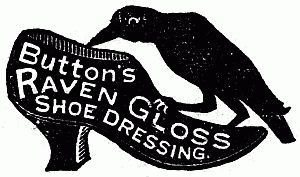
|
GLOSS DRESSING Leading Shoe Dealers everywhere recommend it. It is more economical than other dressings. Take no other. MFRS., NEW YORK. |
SPECIAL OFFER:—We will send you these 9 Books (one of each) for $1.00 and five 2-cent stamps.
The Retail Price of these 9 Books is $2.21.
Send $1.10 for all and sell those you don't want at the retail prices. Circulars free.
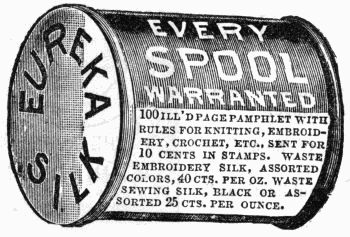
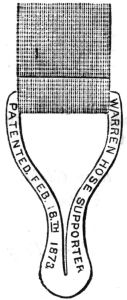
The fastening is made from a single piece of metal, having a wedged-shaped opening, into which a small fold of the stocking is inserted and pulled down between the converging sides, which hold it firmly without cutting or tearing.
"The Warren" is especially desirable for children, as there is nothing to stick into them in case of a fall, and any child can adjust it as readily as a button to a button-hole.
Different arrangements of straps adapted for all ages are also made, as follows:
| No. | 1, | Ladies' | (attached | to Belt), | 40 | cts. | ||
| " | 20, | Ladies' | " | " | Side | Elastic, | 30 | " |
| " | 5, | Misses' | " | " | " | " | 25 | " |
| " | 30, | Childrens' | " | " | " | " | 25 | " |
| " | 40, | Babies' | " | " | " | " | 20 | " |
| " | 7, | Ladies' | " | " | Shoulder- | Brace, | 50 | " |
| " | 8, | Misses' | " | " | " | " | 45 | " |
| " | 9, | Childrens' | " | " | " | " | 40 | " |
Inquire for it at the Dry Goods Stores. If not found, samples will be sent by mail, postpaid, to any part of the U.S. on receipt of price.
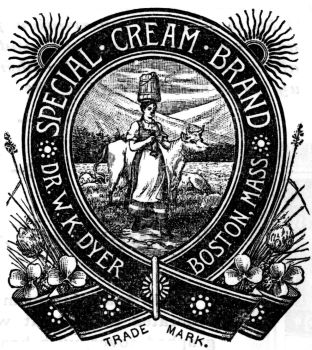
A New Preparation of pure unsweetened Concentrated Swiss Milk. Imported in glass bottles only. It keeps for years in any climate, and is for Infants and Invalids the safest, most digestible, nourishing and fortifying food known. Seven medals already awarded, and highest testimonials from physicians. It is the perfect preventive and cure Infantile Marasmus, Diarrhœa, Sore Mouth, Colic, Summer Complaint, Deficient Vitality, Painful and Retarded Dentition. It undergoes in digestion the same changes as human milk, and cannot cause flatulency. For all purposes superior to new milk. Excellent for Housekeepers, Travellers, etc. Superior for Coffee, Cocoa, Tea, Ice Cream, and all Fine Cooking. Indispensable on shipboard.
Send for circular. For sale by Druggists and Grocers.

The Hartford Mattress is the most comfortable, healthful, luxurious, durable and economical bed in the world. More than 350,000 now in use in the United States. Can be sent in knock down shape, and is easily set up, or may be forwarded set up, at low rates. It is the cleanliest, easiest cared for, most durable mattress ever invented. It will last a lifetime. One-third of life is spent in sleep, Large discounts to the trade. The Hartford Company also manufacture an extensive line of Woven Wire Cots, iron Brass Bedsteads, Sofa-Lounges, Cribs, etc., at low prices.
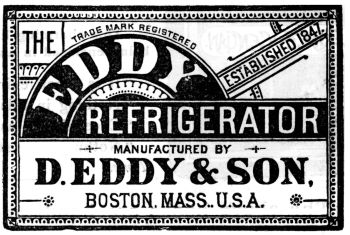
The Publishers's price of these books is $1.50 each, but we will mail either of them postage paid, to the address of any one of our readers who will send us the name of one new subscriber to "Our Little Ones and The Nursery," with $1.50 to pay the subscription for one year. The books are given absolutely free, no extra money for postage or packing is required, and the only conditions under which the offer is made are that the name sent shall be that of a new subscriber, not the renewal of an old subscription, and that the name and money to pay for it shall be sent at the same time.

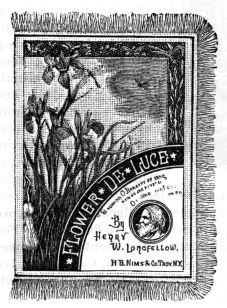
This beautiful poem is reproduced in fac-simile of the original manuscript, and decorated throughout with colored illustrations by Isaac Sprague. Chromo-lithographed cover, with heavy silk fringe and tassel.
"It is a dainty gift book, and a charming form in which to preserve the poem."—Criterion.
"It is as near perfection as artist and printer could make it."—Chicago Journal.
"No gift could be more tasteful or interesting,"—Zion's Herald.
"Another gem of the season."—Watchman.

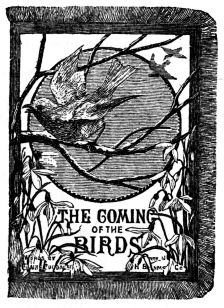
Reproduced in fac-simile of the author's handwriting, and illustrated with beautiful colored designs by Alexander Pope. Decorated covers, with silk fringe.
"Superb in every way—the selection of poem and elegance of finish."—Pittsburgh Post.
"It is the real gem, in its kind of illustration, of all this season's publications."—Sunday Globe.

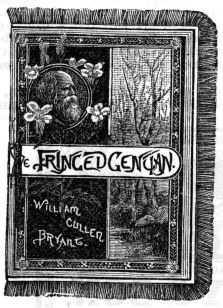
This charming little poem is tastefully and artistically reproduced, each verse being enclosed in an elaborate colored design illustrative of the subject.
"It is a souvenir which every lover of the poet will seek."—Sunday Globe.
"Nothing in this line equals it in taste and elegance."—Pittsburgh Post.
"Exceedingly tasteful and pleasing."—Boston Congregationalist.
"Nothing more striking, appropriate, or artistic could be conceived."—Troy Times.
The above books are handsomely bound and enclosed in neat boxes.
We clip the following from the Boston Herald of June 4th:
The proprietors of a household article recently informed the publishers of a well-known monthly magazine of large circulation that the insertion of a small advertisement twice in the pages of their magazine had brought in more than eight thousand inquiries. And yet some people are still wondering if newspaper and magazine advertising pays?
| Whole Page, one time | $75.00 |
| Half Page, one time | 40.00 |
| Quarter Page, one time | 25.00 |
| One Inch in Column (14 lines Agate) | 6.00 |
| Per Line (Agate) | .50 |
| Fourth Cover Page, or Page facing Reading Matter | { | Whole | $125.00 |
| Half | 65.00 | ||
| Quarter | 35.00 | ||
| Third Cover Page or Page facing either Second or Third Cover Page | { | Whole | 100.00 |
| Half | 55.00 | ||
| Quarter | 30.00 | ||
| Page facing back of Frontispiece, | { | Whole | 90.00 |
| Half | 50.00 | ||
| Quarter | 27.50 |
For advertisements to be continued three months or longer, a special estimate will be furnished on application.
To insure a good position in our next issue, copy should be in our hands by the 28th of the present month.
The right is reserved to decline any advertisement that we may consider to be objectionable.
Correspondence solicited, advertisements prepared, estimates furnished, and all enquiries cheerfully answered by
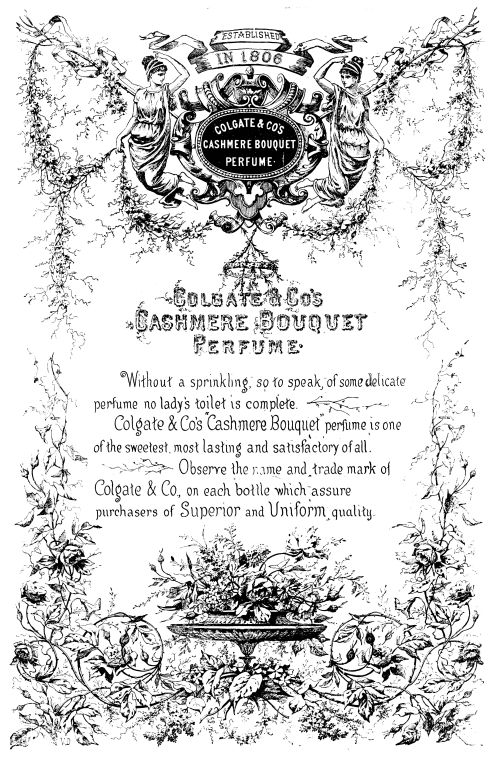
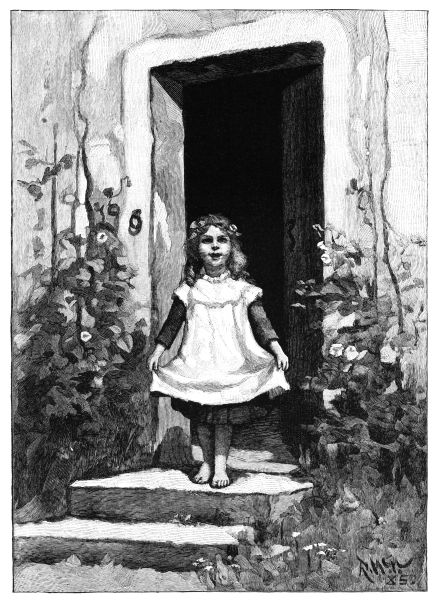
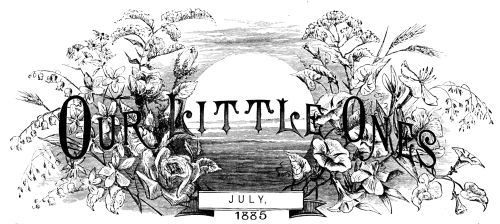
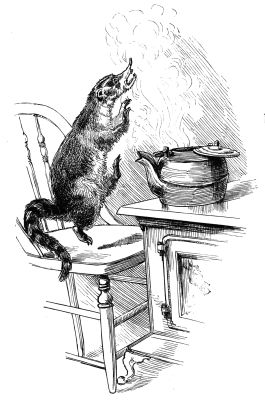
Nasna was a coati-mondi, a cousin of the raccoon family. She was about the size of a cat, with thick, coarse fur, brown on the back and sides, and shading from yellow to orange underneath. She had a head and four legs, and a fat body; but the two most important parts of her, in her own opinion at least, were her nose and her tail. The tail was certainly very handsome, long, and bushy, with black and yellow rings round it. The nose was long, too,—long and sharp, and always poking, poking itself everywhere. There never was such an inquisitive nose. Now it was lifting the lid of a pot on the kitchen fire (for Nasna was tame, and a great pet of her master's), and scalding itself with the steam; now it was sniffing at a bottle of strong ammonia, without seeming to be troubled in the least by the smell; now it was in her master's pocket, trying to find out what it was that went "Tick! tick!"
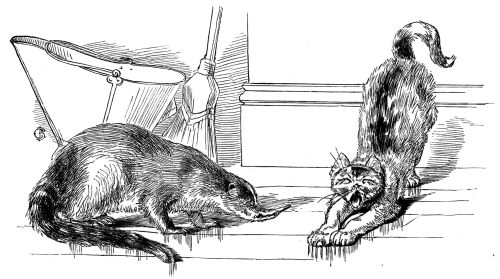
But what do you think the nose did one day? oh! what do you think it did? You never could guess, and so I must tell you.
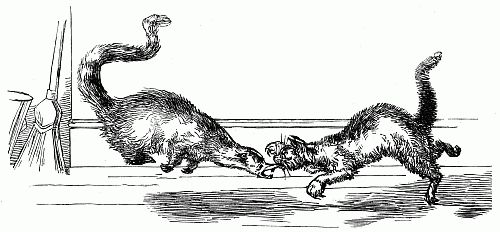
The old cat had been asleep beside the kitchen fire. She had had a long, long nap,—the sleepy old cat,—and when she woke up she felt that she needed a long, long stretch before she was quite herself again. Now, the way in which the old cat stretched herself was this: she put her four feet close together, and humped her back just as high as she[262] could possibly hump it; then she stretched herself, and opened her mouth to its fullest extent, and said, "Mu-aw-yu-aouw!"

This was a singular performance. Nasna had never seen it before, and when she saw the red mouth open, wide, wider, widest, she immediately said to herself, "Dear me! how very odd! I wonder what there is inside that red cavern? I'm going to look!" and the next moment the long, velvety nose was poked right into the old cat's mouth, and almost down her throat.
Did the old cat shut her mouth? She did, indeed, my child; and who can blame her for doing so? But there was a sound of woe in the air, and a squealing as of a coati in despair, and the next moment Nasna was crouching in the farthest corner of the room, holding her wounded nose in both hands, and sneezing violently.
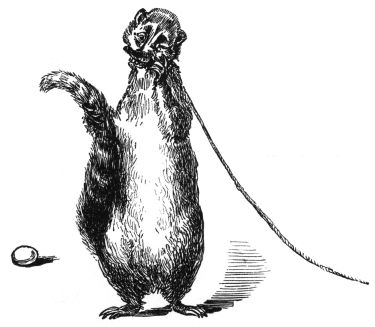
But do not think that this was a lesson to Nasna; nothing of the kind! The very next morning she managed to find her way into the dining-room when the master and mistress were at breakfast. She climbed up at once into the mistress' lap, and poked her nose at the shining coffee-pot. Ah! it was hot. Pop went the nose into the cup of coffee that was steaming beside the mistress' plate. Oh! that was hotter.
"I won't stay here any longer, to be treated so!" cried Nasna; and down she jumped to the floor.
Buzz! buzz! what is that by the window? Something small, flying about, with a black and yellow jacket on. See, now it is crawling on the floor, and Nasna can catch it. Nasna does catch it, putting her soft paw on it. Mr. Wasp extends his sting, as the utmost he has to offer. Nasna squeaks wofully, but does not understand yet, so puts her nose down instead of her paw. This time there is no doubt about the matter, and she retires in great anguish to the kitchen.

One day as she was playing about, tettered by a string to a chair, her master took an egg and placed it on the floor, at a very provoking distance. Nasna could just touch it with one paw, but could not get hold of it. She tried with fore paws, she tried with hind paws; but all in vain: she only succeeded in rolling the egg a little further off. What was to be done? She sat down and looked at the egg long and thoughtfully. At last she put her head on one side and winked: she had an idea. She turned her back on the coveted treasure, and backed towards it as far as she could. Then she grasped her tail with one paw, stiffened it and curved the tip almost into a hook, and, touching the egg with this hook, slowly and cautiously rolled it round in front of her, till she could reach it with her fore paw. Then, in triumph and much pride, she sat up on her haunches, cracked the egg, and sucked it, without spilling a drop. Clever Nasna! I think she deserved a good breakfast, don't you?
"Chow-Chow" was not a pickle, but a chicken, and a real funny one, too.
I made friends with him when he was no bigger than a robin. He was an only child; of course his mother had enough to do to pet and fuss over him. But he would leave her any time when we[264] called "Chow-Chow." We gave him this funny name because he was a great talker. All he said was "C-h-o-w-C-h-o-w," and then "Chow-Chow-Chow-Chow" as fast as he could talk.
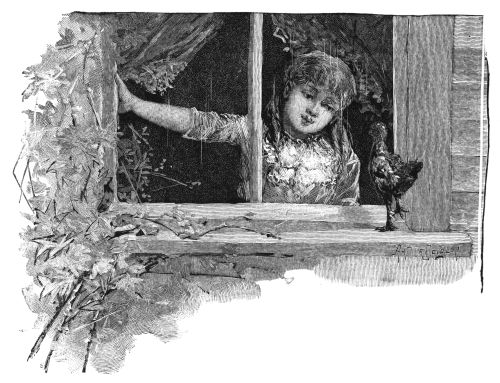
His mother was a beautiful buff Shanghai, but he was a long-legged Brahma, dressed in a speckled black and gray suit. As the days got chilly, in the fall, it seemed as if he suffered dreadfully from cold feet. He was always cuddling down in the warm feathers on his mother's back, even when he was a pretty big fellow.
One day I said, "Come, 'Chow-Chow,' don't trouble your mother. I'll give you a good warming by the kitchen fire." I carried him into the kitchen, opened the oven door, and gave his cold feet a good toasting. Oh, how he enjoyed it! He opened and shut his claws as he lay on my lap, and chow-chowed, and pecked at the buttons of my dress.
The next day it was pretty cold, and the first thing I heard when I went into the kitchen was a tapping at the window-pane. There was "Chow-Chow" on the window-sill, pecking at the glass, and holding up one foot, and then the other. He was talking, or rather scolding, at the top of his voice.
I let him in. He went straight to the stove, and waited for me to take him in my arms and warm his feet. He seemed to think it was ever so much nicer than his mother's feathers.
One cold morning I was busy when he came in. The stove was very hot, and "Chow-Chow"—silly bird!—couldn't wait for me to attend to him. He flew up on the top of the stove. Then he gave a scream, and landed on the table. That was the first and last time he tried to warm his feet without my help.
My sister always said that "Chow-Chow" was a hen. I felt sure he was a rooster. She said, "The first we know 'Chow-Chow' will lay an egg." I said, "The first we know 'Chow-Chow' will crow."
After a while I saw some bright red whiskers under his chin. Then such a pretty coral comb. Still he only talked "Chow-Chow-Chow."
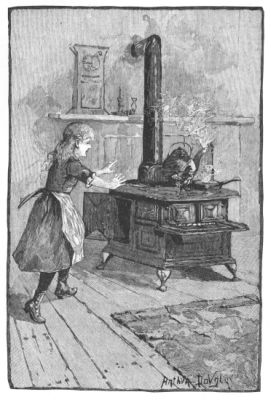
But one morning he came into the kitchen in a great hurry. He jumped upon the table, flapped his wings, and stretched his long neck, opened his mouth, and, oh! such a queer noise! It was a squeak and a roar. I ran upstairs to my sister. "It is a rooster. Didn't you hear 'Chow-Chow' crow?"—"Do you call that a crow? Why, I heard an awful noise, and wondered what it was."
But our chicken grew up one of the handsomest birds I ever saw. And in a few weeks not a rooster in the neighborhood had such a musical, splendid crow as our "Chow-Chow."
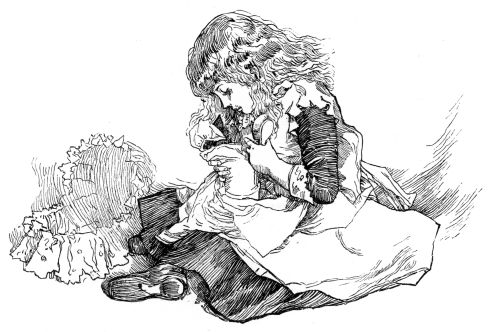
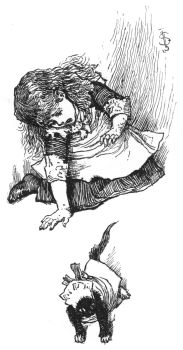
Weezy was so eager to help that she made it hard for herself and for the family. She burned her fingers in stirring hot apple-sauce for Bridget. She woke the baby in trying to curl the few hairs on his little bald head. She meddled with mamma's knitting-work till she had lost every needle. Papa Haynes laughed at these things; but when Weezy learned to open his writing-desk he looked grave.
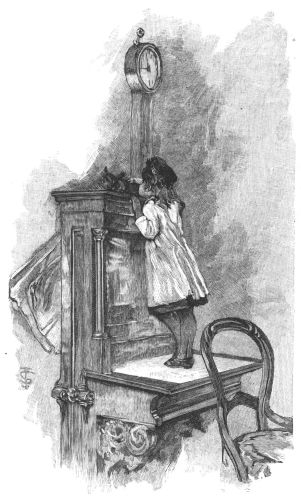
"This'll never do," said he to mamma. "The child will be tearing my papers next."
So he locked the desk, and hung the key above the tall clock beside it.
"There, my young squirrel, you won't reach that in a hurry," he said to himself, kissing his little daughter good-by.
After he was gone mamma stepped into the kitchen to tell Bridget about dinner. Weezy stayed in the sitting-room to sing Sambo to sleep. Every time she rocked back in her small chair she could see the key shining over the clock. It looked very much out of place. She wondered why her papa had put it there. She wanted to whistle[269] with it. Oh hum! if she was a little speck of a bird she would fly against it and brush it down with her wings. Or if Sambo was only an angel! She danced across the floor, and threw him up as high as she could. Instead of knocking down the key she knocked poor Sambo's stocking-yarn head against the wall, and he fell flat upon the top of the desk.
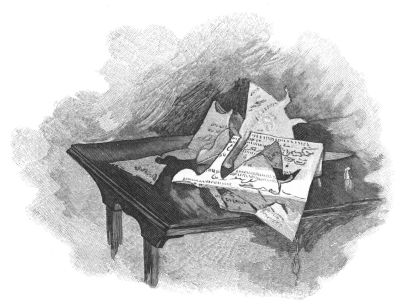
"Lie still, Sambo," cried Weezy, mounting a chair. From the chair she easily climbed to the broad shelf of the desk. There she rested a moment, leaning her chin on the top of the desk and patting Sambo. But she did not take him in her arms, for not far above him hung the key. She had set her little heart on getting it.
What do you think the little sprite did next? All by herself she scrambled to the very top of that big desk. Standing on tiptoe, she tried to reach over the clock! Even then she was not quite tall enough to grasp the key with her chubby little fingers; but by perching upon Sambo she got it at last.
By the time mamma came back Weezy had opened the desk, and cut one of papa's deeds into paper dolls.
Papa was vexed enough, at noon, when he saw them.
"The loss of that deed will give me a great deal of trouble," said he to mamma. "How did Weezy come by the key of my desk?"
"Why, why, is it possible!" said papa, turning pale. "I'm thankful she didn't break her neck,—our little mouse of a Weezy."
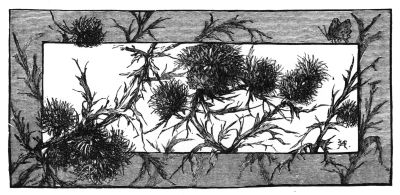
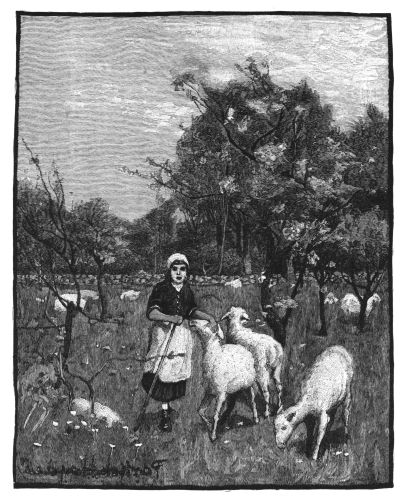

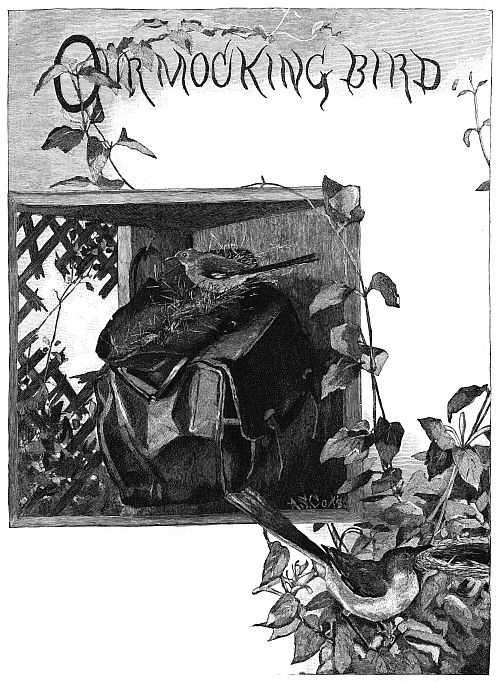
A mocking-bird made his home in a honeysuckle in front of our cosey house. In Arkansas, where we live, this sweet shrub is evergreen. Last year the honeysuckle died, and the bird lost his home; but he liked the place, and he went with his family to the lattice-room, in the rear of the house.
In this apartment he found an old travelling-bag, or gripsack, hanging on a nail. Inside of it[274] was an old soft hat. This seemed to be what the bird wanted, and he made his nest in it. This was his home all winter, and he was happy there. When the cold weather, which we sometimes have in Arkansas, came, he went to the water bucket to drink, and we fed him with crumbs from the porch.
We started the honeysuckle anew, and when it had climbed to the top of the cedar pole it spread out its foliage like an umbrella. The mocking-bird liked his old home, and he moved back to its branches in the spring. He has a nice family in his nest, and they give us music at all times, night and day.
The father bird was as brave as a soldier. His special aversion is a large Newfoundland dog, who is one of our pets. The bird will dart down upon the dog's back, and make war upon him with a peculiar noise, until he drives him away. He does this because he thinks the dog will hurt the young in the nest. When there are no little ones he takes no notice of the dog.
We think this is a great deal better than keeping the birds in a cage. They are tame, and stay with us all the time; but they will not allow themselves to be caught.
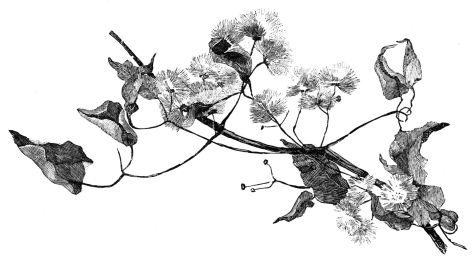
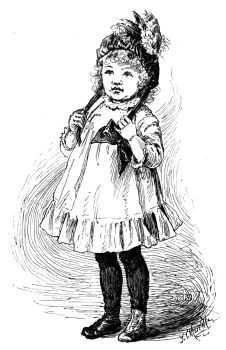
Trottie is a cunning little boy, not quite three years old. His cradle is a little netted hammock. It is fastened at one end to his[275] mamma's sewing-machine, and at the other to a hook in the wall. When Trottie grows tired he does not trouble his mamma, but gets into the little hammock and rocks himself to sleep.
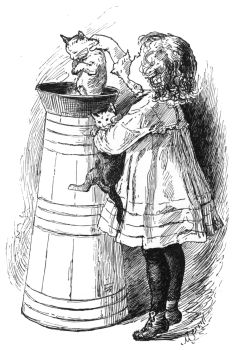
One day the door-bell rang. The little fellow picked up his mother's best bonnet, which she had placed upon the bed. Crushing it down over his little golden curly head he hastened to the door.
He found the minister there, a tall, stately gentleman, wearing a stove-pipe hat. Trottie's strange appearance made the gentleman laugh, and he asked, "Where are you going, my little man?"
Trottie made no answer, but, after a prolonged stare at the stove-pipe hat, asked, "Are you Mr. Yankee Doodle?" Mamma came down just then. Laughing, she invited the visitor in.
Not long afterwards Trottie thought he would like to churn. When his mother's back was turned he put his two dear little kittens, "Starry Eyes" and "Bluebell," into the churn, and poured a cup of water over them. He was just lifting the dasher when his mother heard the kittens mewing and took them out.
He loves the kittens dearly, and would not hurt them for anything.
hen the western light is fading,
And the deepening shadows fall, When the night winds through the branches Softly to each other call; When in grassy country meadows Heavy hang the clovers red, And the stars begin to twinkle In the dusky arch o'erhead; |
When within the crowded city
Spring the dark lamps into flame, And long rows of lighted windows Set the street as in a frame; When the busy hours are over, Cares and worries put away, And the evening enters softly After the retreating day; When the sound of homeward footsteps Echoes through the quiet street, Or the wayside grass is trampled By the tread of hurrying feet,— Then, in stately shining windows, Hung with misty laces white, Or in low-roofed cottage doorways Opening out into the night; With their merry voices silent, And their playthings put aside, Bright eyes, blue or black or hazel, All with eager watching wide, |
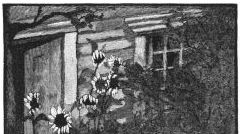
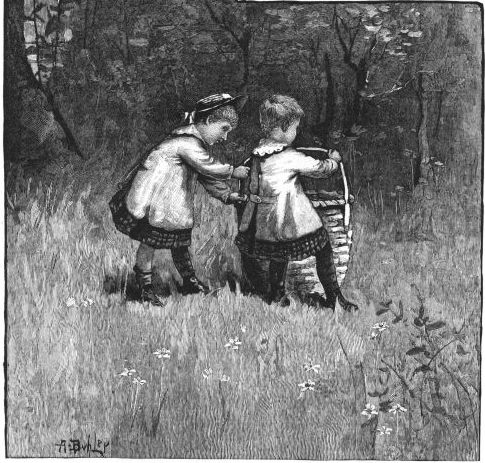
Down at Cape Cod there lived two merry little twin brothers. Very full of fun and mischief were they, and seldom quiet except when they were asleep.
One day their mamma bought some clams. She was going to have a chowder for supper. For safe, cool keeping she put her basket of clams on the grass, under a great tree.
Johnnie and Willie stood by, and heard all that their mamma said about it to auntie. They just looked and heard it all. Their baby faces—for they were only a little over three years old—were as solemn as good old Deacon Pitts', who said he "didn't see why people laughed when there was no occasion."
These two baby-rogues put their bits of plump little hands into the pockets of their pretty white aprons. When mamma and auntie went into the house Nurse Jane sat down on the piazza, knitting in hand, to keep an eye on them. They began to play bo-peep behind the lilac-bushes. When Nurse Jane dropped off to sleep, as she should not have done, then it was that these two small men turned their thoughts to other matters. First, there was a wild chase after butterflies. Pretty soon they trotted down the walk to see Mistress Piggy and her three lazy, grunting children. When the pigs heard voices they, too, piped up, squealing out, as Johnnie afterwards told his mamma, "Give us some! give us some!"
So at that call the laddies pelted Mistress Piggy and her children with tufts of grass. Straying down the walk for more, they spied the basket of clams. In a minute they were dragging the damp basket over the grass, tugging away at the heavy load until their cheeks[280] were scarlet. Then such a pelting as Mistress Piggy and her family had. But they were wild with the supper. They crunched and ate until all the clams were gone. A pile of shells lay by the trough where their food was usually put. "They had the chowder," Willie said.
Mamma and auntie had no chowder that night!
I do not know what mamma said to her small boys, but I do know that they went very early to bed.
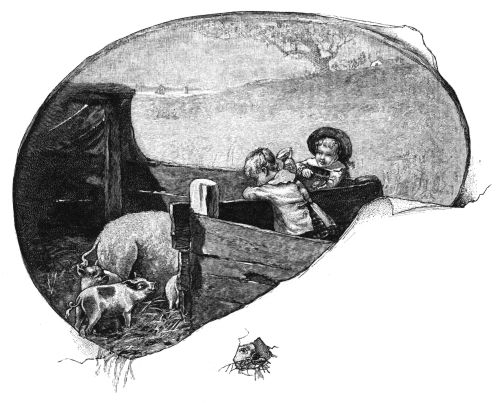
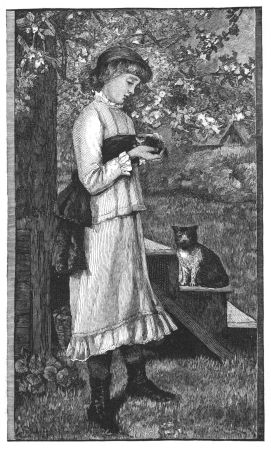
When I was a little girl I had a dear old pussy. She was black and white, handsome and dignified, yet a grand playfellow when she chose to put off her dignity.
Great was my delight, one lovely spring morning, to find that pussy had two beautiful little babies in an old basket under the shed steps. She was so glad to have me see them, and so proud of the little soft, plump things, that she purred her loudest.
For three weeks mamma, kitty, and I nursed those babies with increasing pleasure. Whenever she wanted to take the air, or call on a friend, I was always ready to sit by the basket till she came back.
One sad night Thomas Gray, an old enemy of pussy's, broke into her house and killed both those darlings. Their mother didn't shed a tear, but my tears fell fast. The little creatures had just begun to be very cunning, and my disappointment was sore.
Over in the brick house across the street was another mamma kitty, with five nice children. They were about the same age as our kittens. Two were very like ours; so I got the idea of begging for them, and giving them to my pussy. Away I ran to ask my mamma's friend in the brick house if she would give me two of her kittens. She laughed, and said, "I wish you would take them all."
I carried home the two I wanted, and gave them to our sad pussy as she lay by the kitchen stove. At first she sniffed at them eagerly, but they didn't smell one bit like her own sweet babies. Then she was angry at the trick I seemed to be playing. Her eyes looked fierce. She rose up, growled, and spit at the little strangers, and tried to run away. But I held her while Mary, the girl, brought some milk in a saucer. Kitty was hungry, and so were the little ones; they tried to lap the milk with her, but they could only wet their bits of noses, and nearly sneezed their ears off.
Then they cried piteously, and looked at our pussy mother in such an appealing way that it seemed to touch her. In a little while she curled down on the floor and let them take her own babies' places.
Presently she began to wash their little heads, and then to sing "gray thrums" to them. At last she made up her mind that they were very nice little things, and she would be a good mother to them. And she was. Nobody would ever guess that they were not her own children.

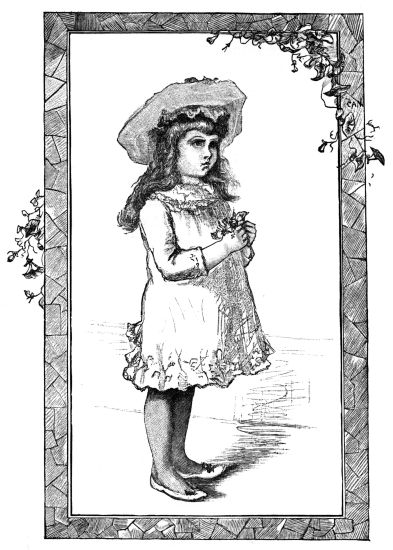


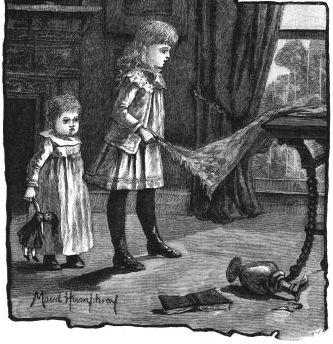
"Katy-did-it! Katy-did-it!" sang the katy-dids in the trees. Who was Katy, and what did she do, that all night long the insects sang about her?
Who was Katy? Why, a pretty little girl, six years old. Such a merry little girl that every one loved her. Katy had come out to stay with Grandma Lee. Mamma's sister was very sick, and mamma had gone to nurse her. Papa sent Katy and little Tom, with their nurse, to grandma's.
Grandma Lee lived in the country, in a large house, with a beautiful garden to it. Back of the garden was the barn, where Katy liked to hunt for eggs, and play in the hay. So Katy played from morning till night at grandma's, and was very happy.
One warm afternoon she thought she would go into the parlor and get a book that had beautiful pictures in it. It was on a table that[285] had a scarf hanging over the edge. When Katy reached to get it she pulled the table-scarf off. Down fell the book and a large vase, which was broken all to pieces.
"Oh, dear!" said Katy, "grandma will be so angry. I am afraid to tell her."
Little Tom had followed Katy in, and now stood beside her. Just then Katy heard grandma coming, and ran out on the porch.
She heard grandma say, "You naughty boy, to break grandma's pretty vase!"
Then Katy thought grandma will never know it was I who did it; for Tom cannot talk, and he is always breaking things. I won't tell her I did it. So she ran away, and did not come in till grandma called her. Then grandma told her that Tom had gone into the parlor, and had broken the vase by pulling the scarf off the table.
Katy did not say a word, but she could hardly eat her supper. When little Tom came up to kiss her "Good-night," before nurse put[286] him to bed, she almost cried. But she thought it would not do to tell then. She was glad when bed-time came, she felt so unhappy.
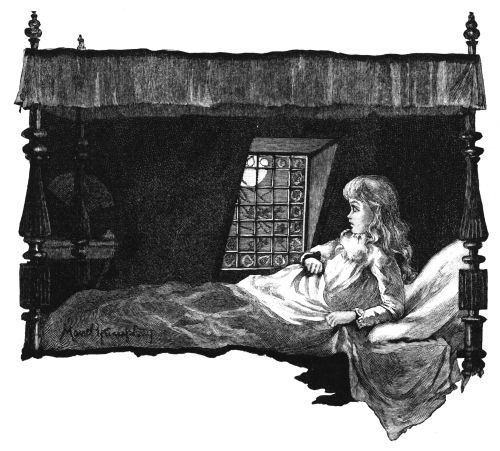
Katy slept in a little room that opened into grandma's. In the middle of the night she heard a noise and waked up. The moon was shining into the room, and it was almost as light as day. She heard something which sounded like "Katy-did-it! Katy-did-it! Katy-did-it!"
She pulled the sheet over her head to shut out the noise; but still she heard the singing, "Katy-did-it!"
"They mean me," said Katy. "I wish they would stop." But they only sang the louder.
Katy could stand it no longer. She jumped out of bed and ran into grandma's room, crying, "O grandma, grandma, Katy did it!"
Grandma jumped up, saying, "Why, child! what's the matter?"
"O grandma," sobbed Katy, "Tom did not do it; Katy did it."
"Did what?" asked grandma.
"I broke the vase," replied Katy, "and then let you think Tom did it."
Then Katy told grandma how the Katy-dids would not let her sleep till she had told her all about it. Grandma said she hoped Katy would never be afraid again to say "Katy did it," when she had done wrong. I think, after that, she never was.
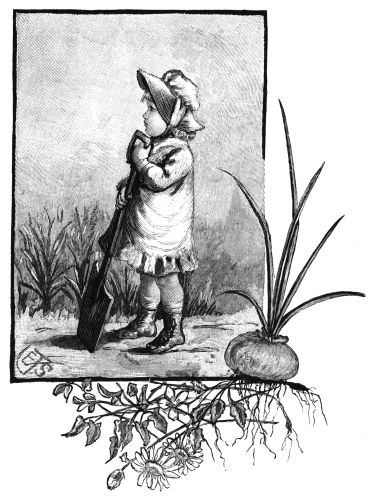
[A] Composed for "Our little Ones."
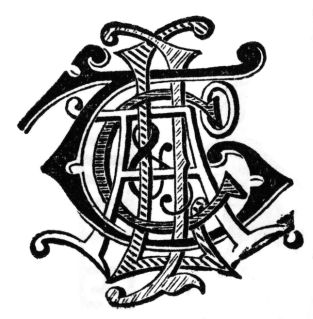
That it pays policy-holders $4,000 a Day for Losses by Death and Disabling Injury.
That it has paid $10,500,000 to policy-holders since 1864.
That ONE IN NINE of all insured under its Accident Policies have received Fatal or disabling injuries.
That it is also a LIFE COMPANY, with LARGER ASSETS in proportion to its LIABILITIES than any other successful Company.
That it Secures Full Payment of Policies by $7,826,000 Assets, $1,947,000 Surplus.
That its Policies are all Non-Forfeitable.
That it pays ALL CLAIMS, Life and Accident, without discount, and immediately upon receipt of satisfactory proofs.
That its Rates are as low as will permanently secure Full Payment of the face value of Policies.
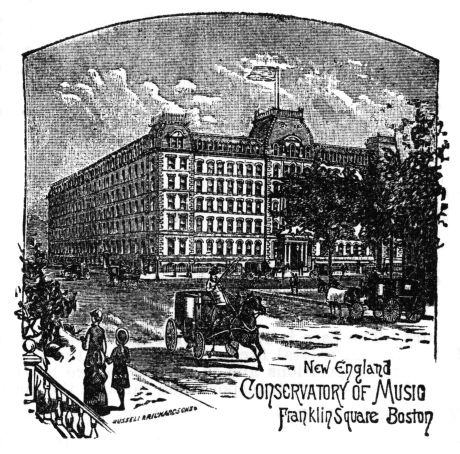 New England Conservatory of Music Franklin Square Boston large building with horse and buggy driving by
New England Conservatory of Music Franklin Square Boston large building with horse and buggy driving by
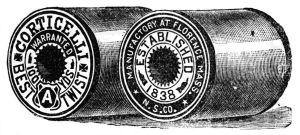
Every spool warranted unequalled for Hand or Machine Sewing. Smooth, Strong, Full Length. Ladies, ask your storekeeper for "CORTICELLI" Spool Silk.
Our latest Book on Knitting (No 5), with samples of Knitting and Etching Silk, sent on receipt of three two-cent stamps.
| Lundborg's Perfume, Edenia. |
| Lundborg's Perfume, Maréchal Niel Rose. |
| Lundborg's Perfume, Alpine violet. |
| Lundborg's Perfume, Lily of the Valley. |
A box containing Samples of all the above five articles prepaid to your nearest Railroad Express Office (which should be named) for Fifty Cents—Money Order, Stamps or Currency.
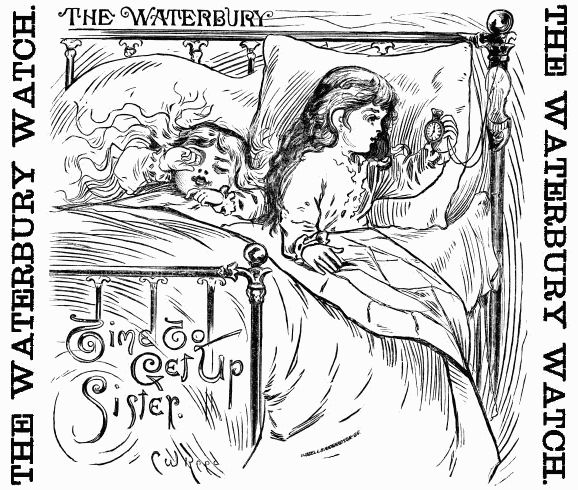
THE WATERBURY WATCH is a stem-winder, and will run 28 hours. The case is Nickel-Silver, and will always remain as bright as a new silver dollar. The Watch has a heavy beveled edge and crystal face. The works of the Watch are made with the finest automatic machinery. Every Watch is tested in varying positions and is perfect before leaving the factory. Every Watch is put up in a handsome new improved satin-lined case for safe transportation through the mails.
Teach your children to be on time. Give them a WATERBURY WATCH. No Boy or Girl should be without one.
So perfect is the machinery used in making this Watch, and so exact are all its parts, that if it needs repairs, if sent direct to the factory, the charge for actual repairs (including parts used) never exceeds 50 cents. This will explain why they are so cheap and so easily repaired.
"I have used the Waterbury Watch for some time and find that it is the only one which will keep reasonably perfect time when used around powerful dynamo machines."
The New York Tribune says: "It is remarkable how quickly the Waterbury Watch has stepped into popular favor. No doubt, the secret of its instant success has been the fact of its excellence. No amount of advertising could push into favor a poor article. The Waterbury Watch is good and cheap."
"I have carried a Waterbury for over a year and find it a most excellent time-keeper. It has run beside a $100 gold watch without showing the least variation."—F. G. PERRY, Wakefield, R. I.
"My Waterbury after three years' trial continues to give satisfaction, and is now going as good as when I received it. At four o'clock daily we receive the time over our wire, and my watch is always prompt to the minute."—A. S. LETTS, Pennsylvania Railroad, Jersey City.
The advertiser refers to the publishers of this magazine and to the North National Bank of Boston, as to his responsibility.
Address all orders to

Writes 10,000 to 20,000 words with once filling. Never leaks or blots. A perfect pen and ink bottle combined. Will last for years. Price, $2.00 plain; $2.50 gold mounted. Sent by registered mail, on receipt of price. A six month's supply of ink forwarded on receipt of 25 cents.
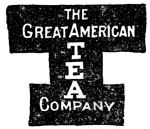
Greatest inducements ever offered, Now's your time to get up orders for our celebrated Teas and Coffees, and secure a beautiful Gold Band or Moss Rose China Tea Set, or Handsome Decorated Gold Band Moss Rose Dinner Set, or Gold Band Moss Decorated Toilet Set. For full particulars address
| CANDY | Send $1, $2, $3, or $5 for a retail box by express of the best candies in America, put up elegantly, and strictly pure. Suitable for presents. Refers to all Chicago. Address |

| 117 | PIECES. | 10 Lovely Dolls and wardrobe; 3 sets Doll's Parlor, Dining and Bedroom Furniture all for 23cts. NOVELTY CO., Passaic, N. J. |
| 100 | SCRAP PICTURES, no 2 alike and set of 4 large Adv. Cards for 10c. C. C. DePUY, Syracuse, N. Y. |
To most teachers this little magazine is familiar, as it is largely used in schools throughout the country as a supplementary Reader. To any others a sample copy will be sent free, on application to the publishers.
| BOSTON REFERENCES | { | Lee and Shepard; Estes & Lauriat. |
Correspondence solicited and estimates furnished for any desired line of advertising. Advertisements inserted in all first-class publications at lowest rates.
"Simplest, Best and only Perfect Filter." S. W. Lambeth, Phila. "It makes our muddy river water clear, pure and sweet as mountain spring water. G. W. Stewart, Atty., St. Louis. "Best Filter in the world." Joseph Jones, M. D., New Orleans. The demand so great the owners have opened a place in New York. |
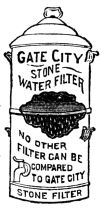 |
"The Ne Plus Ultra of Filters." Dover Stamping Co., Boston. "It is simply perfect. Prof. J. A. Gray, Atlanta. "A perfect Filter." L. Strauss & Sons, New York. Avoid Cholera, Malaria, Brights Disease, Typhoid and Scarlet Fever. Send stamp to Gate City Stone Filter Co, 14 East 14th St., New York for price list. |
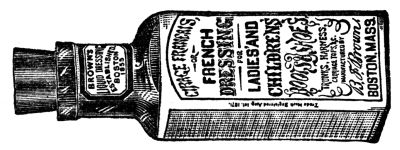
Estimates furnished for Public and Private Displays. Catalogues mailed on application, and mail orders promptly attended to.
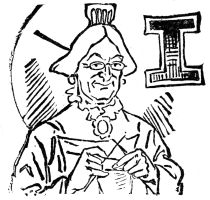
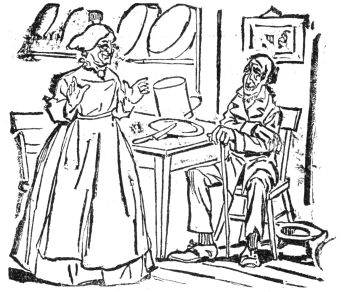
"I cut him a pie and got him a pitcher of milk, cause I could see he was powerful hungry, and when he got filled up he commenced: 'Cleanliness is next to Godliness; now,' says he, 'what makes this home look so bright and pure as the lily?' Says I 'It's Sapolio.'
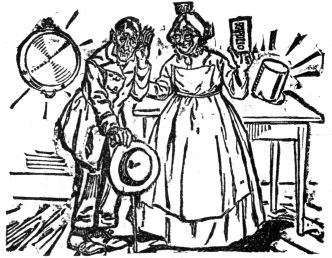
"'How?' says he, putting his hand to his ear, 'cause he's a little deaf. 'Sapolio!' I yelled in his ear. 'No,' says he, 'no; it's virtoo, moral virtoo, that's er shining through it all,' and he kept that up till supper time, and stayed and eat a big supper (I'm afraid they ain't er feeding the old man as well up to his house as they oughter); and after he had gone hum, I couldn't help thinking, as I looked at my floor, table, pans and etceterer, that it may be moral virtoo shining through 'em, but it takes Sapolio to fetch it out!"
If your grocer does not keep Sapolio he can order it for you from any wholesale grocer in the United States.
It is a solid, handsome cake of scouring soap, which has no equal for all cleaning purposes, except the laundry.
What will Sapolio do? Why, it will clean paint, make oil cloths bright. You can scour the knives and forks with it, and make the tin things shine brightly.
The wash basin, the bath tub, even the greasy kitchen sink, will be as clean as a new pin if you use SAPOLIO.
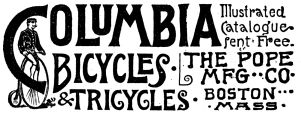
An Incomparable Food. Ready for immediate use. Unequaled for children and invalids. A delicious diet. Unsurpassed for constipation and dyspepsia. Sold by Grocers. Box by mail, 48c. Our Home Granula Co., Dansville, N. Y., Manufacturers.
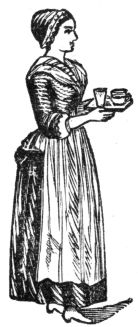
Warranted absolutely pure Cocoa, from which the excess of Oil has been removed. It has three times the strength of Cocoa mixed with Starch, Arrowroot or Sugar, and is therefore far more economical. It is delicious, nourishing, strengthening, easily digested, and admirably adapted for invalids as well as for persons in health.
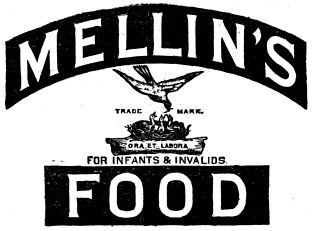
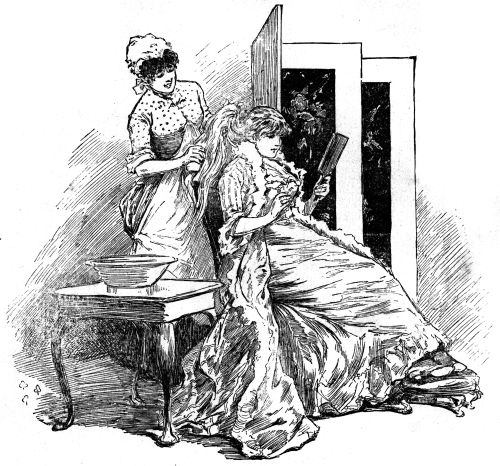
For washing the hair only the very best soap and pure water should be used.
The average soap contains too much free alkali, which draws the natural oil from the hair and scalp, and leaves the former dry and lusterless while it roughens the latter, causing scurf or dandruff.
The purity and mildness of the Ivory Soap gives it pre-eminence for cleaning the hair and scalp. It contains no free alkali, so its use insures a clean and healthy head of hair of the luster and softness of silk.
If Cleanliness is next to Godliness, Soap must be considered as a Means of Grace and a Clergyman who recommends moral things should be willing to recommend Soap. I am told that my commendation of Pears' Soap has opened for it a large sale in the United States. I am willing to stand by every word in favor of it that I ever uttered. A man must be fastidious indeed who is not satisfied with it.
I HAVE FOUND IT MATCHLESS FOR THE HANDS. COMPLEXION.
Nothing adds so much to personal appearance as a Bright, Clear Complexion and a Soft Skin. With these the plainest features become attractive. Without them the handsomest are but coldly impressive.
Many a complexion is marred by impure alkaline and Colored Toilet Soap.
Is specially prepared for the delicate skin of ladies and children and others sensitive to the weather, winter or summer. In England it is pre-eminently the complexion Soap, and is recommended by all the best authorities, as, on account of its emollient, non-irritant character, Redness, Roughness and Chapping are prevented, and a clear and bright appearance and a soft, velvety condition imparted and maintained, and a good, healthful and attractive complexion ensured.
Its agreeable and lasting perfume, beautiful appearance, and soothing properties commend it as the greatest luxury of the toilet. Its durability and consequent economy is remarkable.
Obvious punctuation errors repaired.
The remaining corrections made are listed below.
Page 270, "PEM" changed to "PENN" (PENN SHIRLEY)
Page 288, song, "hopless" changed to "hopeless" (rules is hopeless)
Ivory Soap advertisement, "healty" changed to "healthy" (and healthy head of)
Advertise in "Our Little Ones and The Nursery", "the the" changed to "the" (the library shelf)